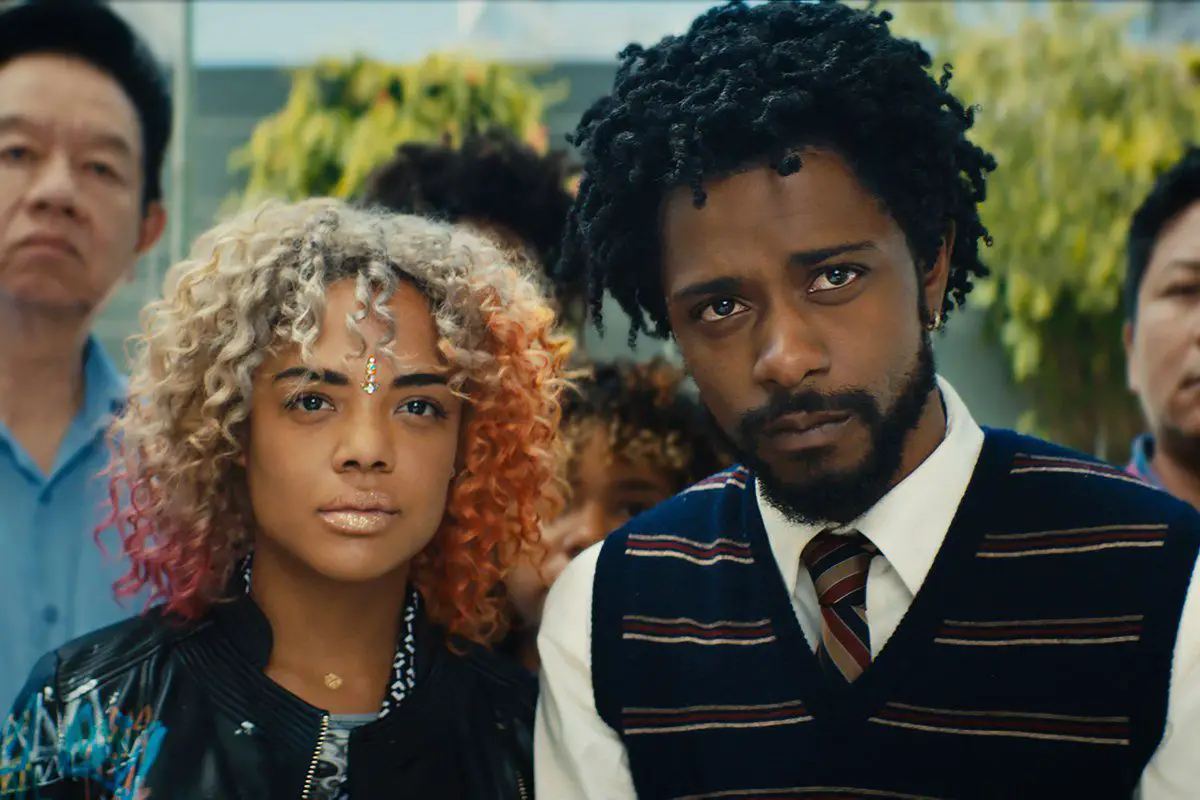Sci-fi comedy “Sorry to Bother You,” which stars the budding phenom Lakeith Stanfield, already boasts a 95 percent Tomatometer Rating on Rotten Tomatoes from critics even before its July 13 national release. These critics, though, fail to address an issue that the “fearlessly ambitious” film perpetuates: that the movie itself reinforces the validity of its premise, which is that sounding white can be an advantageous character trait.
In the film, Stanfield plays Cassius “Cash” Green, a telemarketer in an alternate universe Oakland, who “discovers a magical key to professional success, which propels him into…material glory.” The film also features several other characters, including, Detroit, Cash’s girlfriend, Langston, his cubicle neighbor and Steve Lift, his boss.
Lanston, played by Danny Glover, offers his new coworker a tip beyond sticking to the predetermined script by saying, “If you want to make some money here, use your white voice.” After presumably doing so, things begin to turn around for Cash as he receives many high fives from his coworkers and a promotion from his boss.
The “white voice” comment not only sparks a much deeper issue in the scene, but also in the entire basis of the movie. Cash is not successful in his job because he doesn’t sound white enough to the customer on the other end and thus must disguise his voice to close a sale. Linguistic profiling runs through the veins keeping this movie alive and kicking.

The term, first coined by Professor John Baugh, is defined as the practice of identifying social characters based on dialect or accent. The professor introduced the term after conducting a study based upon the practices of the housing market and moved forward by further studying legal proceedings, employment opportunities and education.
As a preliminary test in order to distinguish dialects, an experiment was conducted with 50 Caucasian undergrads. After listening to a recording of a simple, “Hello,” respondents could identify the correct ethnicity 70 percent of the time.
Baugh would call landlords to inquire about available housing whilst using three different dialects: Standard American English, Chicano English and African American Vernacular English. His results would vary greatly depending on the dialect he spoke; certain available houses suddenly became unavailable in certain instances.
The issue in “Sorry to Bother You” is not whether or not others can identify another’s ethnicity over the phone or by their dialect. Clearly, due to Baugh’s study, it is relativity easy to do so. The ability to make these determinations crosses into murky water when people make decisions, such as denying housing or education, based on that knowledge.
In the film, both Lanston and Cash’s voices get dubbed over by David Cross and Patton Oswalt, both well-known Caucasian actors. “White voice,” in this film, is seen as an advantage to an African-American man struggling in his work. The notion that if Cash did sound white he would be better is inherently wrong and fuels yet another device to compare and detach ourselves from others — another reason to make a group a “them” instead of an “us.” American society doesn’t need to separate more than the country already is.
Villains in movies often have foreign accents in a native Standard American English user’s eyes, whether it be British or even Russian. While entirely deliberate, this practice fills in the character development left out by directors.

If the villain has a Russian accent, stigmas attached to the country will follow the character, thus making it redundant in explaining why they’re evil in the first place. Voice choice carries a lot of weight in storytelling, so when choosing one with predetermined traits, it comes off as lazy effort to fill out character.
A.O, Scott, the film critic for the New York Times, wrote, “His (director, Boots Riley) take on the code-switching that is part of how African-Americans function in white-dominated social spaces involves giving certain characters access to a ‘white voice.'”
Scott’s link to an NPR article regarding code-switching uses a different definition from what a linguist would use. The term both Scott and NPR should have used is a register change, which is defined as switching a variety of a language used for a particular purpose or in a particular social setting. Someone talking with their friends versus talking to their boss would be a register change. Code switching, though, is alternating between languages in a single conversation.
Of course, everyone changes registers everyday depending on who they come in contact with, but “Sorry to Bother You” does not exemplify this phenomenon at all. Both Scott and NPR argue that the characters take part in a register change, but the change in voice shown is purely based upon the prestige of a “white voice.”
Movies that show a blatant act of linguistic profiling, like “Sorry to Bother You,” should not go unnoticed in a time when sensitivity surrounding discrimination runs high. Language and voice become the most important aspect of identity to the point that it’s impossible to be an individual without them. Cash’s change to sound more “white” further challenges his identity as an African American man trying to further improve the life he had while living in a garage.
If the shoe were on the other foot and a Caucasian actor began using a “black voice” as a pertinent part of the storyline, how would that movie be perceived? As an off-color and unfunny social commentary aimed at degrading African Americans? Boots Riley’s “Sorry to Bother You” provides an insight into what some believe, is in fact, the gateway to greater success, but then again, this movie claims to be a comedy, so we can take their view with a grain of salt.











